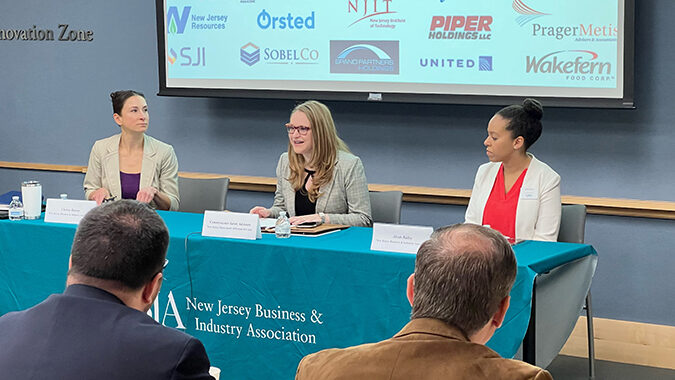By Jim Pytell, Managing Editor, New Jersey Business Magazine
This morning, Commissioner of the Department of Human Services Sarah Adelman participated in an NJBIA Meet the Decision Makers event in which she spoke about key investments being made by the department, including wage increases for direct support professionals and more than $700 million to support various aspects of the childcare sector.
“Childcare is a centerpiece of our economy and our economic recovery,” Adelman said, explaining that the governor’s budget plan includes the continued implementation of more than $700 million in federal investments to help parents pay for childcare, provide higher pay to childcare workers, and increase support for childcare providers over the next two years.
“The department has invested $200 million to help parents reduce their childcare expenses and put dollars back in the pockets of working families,” she continued. “A single parent with one child in care is saving more than $700 a year. And we’ve issued more than $30 million for bonus pay to more than 30,000 childcare workers.”
The department has also approved $180 million in new stabilization funds for nearly 3,000 childcare centers and providers across the state, which aim to help with operational expenses.
In total, over the past two years, the department has delivered more than $1 billion in childcare assistance, injecting aid to a sector which keeps the state’s workforce operational.
Adelman also highlighted the more than $210 million in new state and federal funding targeted at raising wages for childcare workers, direct support professionals, home health aides and personal care assistants, private duty nurses, mental health and addiction professionals, certified nurse aides and other nursing home employees.
“In partnership with the Legislature, we have increased direct support professional wages four times since FY19, and beginning in FY23, hourly wages for direct support professionals will have increased by $4.75,” she said.
In fact, in the latest national survey of direct support professional wages, New Jersey is among the top five states for pay and among the top three states with the lowest turnover rates.
Adelman predicts that the state will continue to lead the way in caring for individuals with intellectual and developmental disabilities.
The department has also made numerous investments in other areas including food assistance, enhanced services for older adults and individuals with disabilities, protected health coverage for more than 2 million residents, and expanded access for those needing mental health and addiction services.
Additionally, Adelman acknowledged the challenge of rising healthcare costs, and cited the Health Care Affordability, Responsibility and Transparency (HART) program, which was launched lastmonth and sets targets for healthcare leaders to meet in regards to healthcare costs, as one tool to help combat the challenge.
“The high cost of healthcare remains a deterrent for too many families. This blueprint — created by bringing together healthcare leaders, businesses, and consumers — serves as a guide and our collective commitment to control cost growth, including state costs in our Medicaid program, to ensure more affordable care for New Jersey families,” Adelman said. “We have more great work to do, and I look forward to getting it done.”




